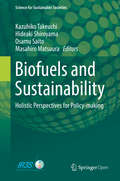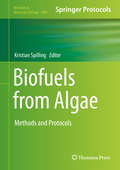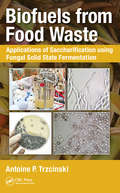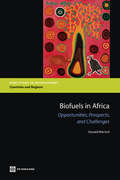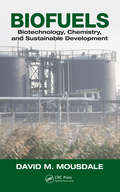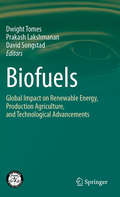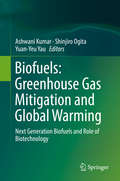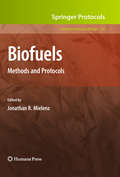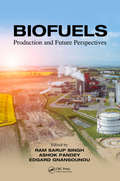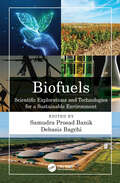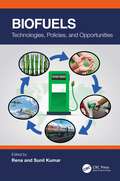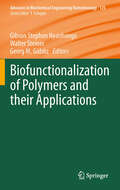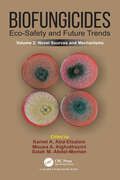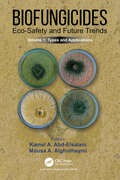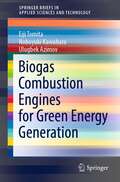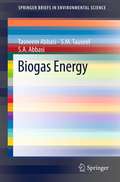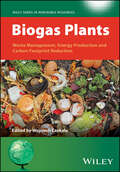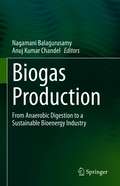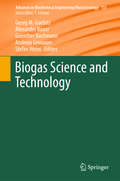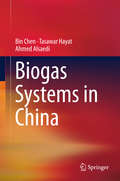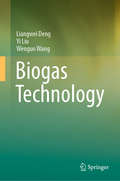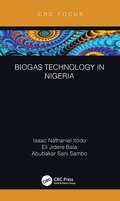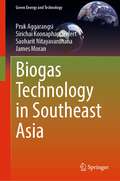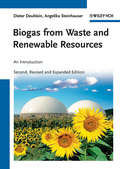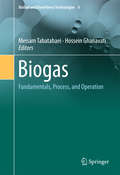- Table View
- List View
Biofuels and Sustainability: Holistic Perspectives for Policy-making (Science for Sustainable Societies)
by Hideaki Shiroyama Osamu Saito Kazuhiko Takeuchi Masahiro MatsuuraThis open access book presents a comprehensive analysis of biofuel use strategies from an interdisciplinary perspective using sustainability science. This interdisciplinary perspective (social science-natural science) means that the strategies and policy options proposed will have significant impacts on the economy and society alike. Biofuels are expected to contribute to reducing greenhouse gas emissions, revitalizing economies in agricultural communities and alleviating poverty. However, despite these anticipated benefits, international organizations such as the FAO, OECD and UN have published reports expressing concerns that biofuel promotion may lead to deforestation, water pollution and water shortages. The impacts of biofuel use are extensive, cross-sectoral and complex, and as such, comprehensive analyses are required in order to assess the extent to which biofuels can contribute to sustainable societies. Applying interdisciplinary sustainability science concepts and methodologies, the book helps to enhance the establishment of a sustainable society as well as the development of appropriate responses to a global need for urgent action on current issues related to biofuels.
Biofuels from Algae: Methods and Protocols (Methods in Molecular Biology #1980)
by Kristian SpillingThis volume provides a comprehensive overview of different ways to grow algae and the techniques used to start algal cultivation, monitor algal growth, environmental impact of growing algae, and various methods for characterizing the biomass. The chapters in this book discuss a range of topics such as step-by-step protocols on how to isolate and grow algae; descriptions on how to use fluorescence to estimate algal biomass and lipid content; and instructions on using advanced techniques to determine the carbohydrates and lipids in algal biomass. Written in the highly successful Methods in Molecular Biology series format, chapters include introductions to their respective topics, lists of the necessary materials and reagents, step-by-step, readily reproducible laboratory protocols, and tips on troubleshooting and avoiding known pitfalls.Authoritative and cutting-edge, Biofuels from Algae: Methods and Protocols is a valuable resource for novice and experienced researchers who want to learn more about this impactful and developing field.
Biofuels from Food Waste: Applications of Saccharification using Fungal Solid State Fermentation
by Antoine Prandota TrzcinskiAccording to the UN's Food & Agricultural Organization (FAO), one third of food produced globally for human consumption (nearly 1.3 billion tons) is lost annually. Food waste has often been incinerated with other combustible municipal wastes for possible recovery of heat or other forms of energy, however, incineration is not cost-effective, and can cause air pollution. Due to its organics- and nutrient-rich nature, food waste could be viewed as a useful resource for production of high-value platform chemicals through fermentation. This book examines the bioconversion of food wastes to energy and the recent developments in ethanol, hydrogen, methane, and biodiesel production from food wastes.
Biofuels in Africa
by Donald Donald MitchellA new economic opportunity for sub-Saharan Africa is looming large: biofuel production. Rapidly rising energy prices are expected to remain high for an extended period of time because of the increasing demand in prospering and populous countries such as China and India, the depletion of easily accessible supplies of crude oil, and concern over global climate change. As a result, there is renewed interest in biofuels as an alternative to fossil fuels. Africa is uniquely positioned to produce these new cash crops for both domestic use and export. The region has abundant land resources and preferential access to protected markets with higher-than-world-market prices. The rapid growth in the demand for transport fuels in Africa and high fuel prices create domestic markets for biofuels. The European Union and the United States have approved legislation that requires large increases in the consumption of biofuels over at least the next decade. Imports are expected to be needed to meet these mandates, thus opening the door to African and other developing countries that can produce biofuels or feedstocks for biofuels competitively. Expanding the production of crops for biofuels will affect the entire rural sector in Africa as resources are shifted away from traditional crops and the prices of all agricultural commodities rise. Even smallholders can participate in producing biofuel crops. To promote the sustainability and significant contribution of this enterprise, Biofuels in Africa provides guidance in formulating suitable policy regimes, which are based on protecting the rights of current land users, developing revenue-sharing schemes with local communities, safeguarding the environment and biodiversity, expanding institutional capacity, formulating new regulations and procedures, and emulating best practices from experienced countries. This volume will be of value to anyone interested in biofuels, including policy makers, development practitioners, private investors, researchers, and the general public. Now that African countries are trying to significantly increase their energy supply systems, biofuels are an attractive option using both dedicated crops and agricultural waste. This book provides guidance for them to develop a suitable policy regime for a significant contribution by biofuels. -Professor Ogunlade R. Davidson, Minister of Energy and Water Resources, Sierra Leone Biofuels in Africa is a sorely needed resource for our understanding of the problems of expanding biofuels production in Africa. A high point of the book is a description of the projects that were started in several countries. A very useful book! -Professor José Goldemberg, University of São Paulo, Brazil As Africa most likely will play the same role for global biofuels as the Middle East does for oil, this comprehensive book on African biofuels should be compulsory reading for anyone interested in either African development or biofuels. The book captures the essence of long-term drivers and opportunities as well the complex challenges for investors and society of this huge emerging industry. -Per Carstedt, Executive Chairman, EcoEnergy Africa
Biofuels: Biotechnology, Chemistry, and Sustainable Development
by David M. MousdaleEvaluating a wealth of quantitative data, Biofuels: Biotechnology, Chemistry, and Sustainable Development discusses different types of biofuels, the science behind their production, the economics of their introduction to the marketplace, their environmental impacts, and their implications for world agriculture. It broadens the discussion on biofuel
Biofuels: Global Impact on Renewable Energy, Production Agriculture, and Technological Advancements
by Prakash Lakshmanan Dwight Tomes David SongstadThis comprehensive volume developed under the guidance of guest editors Prakash Lakshmanan and David Songstad features broad coverage of the topic of biofuels and its significance to the economy and to agriculture. These chapters were first published by In Vitro Cellular and Developmental Biology In Vitro Plant in 2009 and consists of 15 chapters from experts who are recognized both for their scientific accomplishments and global perspective in their assigned topics.
Biofuels: Greenhouse Gas Mitigation and Global Warming
by Ashwani Kumar Shinjiro Ogita Yuan-Yeu YauThis timely book is a compilation of edited articles by distinguished international scientists discussing global warming, its causes as well as present and future solutions. Social and economic growth at global level is measured in terms of GDP, which requires energy inputs generally based on fossil fuel resources. These, however, are major contributors to increasing levels of CO2, causing 15 tonnes of green house gas emissions per capita. Renewable sources of energy offer an alternative to fossil fuels, and would help reduce this to the 2 tonnes of greenhouse gas emissions per capita per annum needed to achieve sustainable growth. As such, the book discusses the next-generation of biofuels and all related aspects, based on the editors’ significant investigations on biofuels over the last 30 years. It also presents the latest research findings from research work carried out by contemporary researchers. Presenting global biofuel perspectives, it examines various issues related to sustainable development of biofuels in the contexts of agriculture, forestry, industry and economic growth. It covers the 1st to 4th generation biofuels, as well as the status of biofuel resources and their potential in carbon neutral economy. Offering a comprehensive, state-of-art overview of current and future biofuels at local and global levels, this book appeals to administrators, policy makers, universities and research institutions.
Biofuels: Methods and Protocols (Methods in Molecular Biology #581)
by Jonathan R. MielenzWith the dwindling supplies of fossil fuels and growing concerns regarding climate changes due to green house gasses from these fuels, public opinion has swung dramatically towards favoring the development of renewable energy sources. In Biofuels: Methods and Protocols, career-long experts explore a full range of methods for bioenergy covering important topics such as biomass production and delivery to the biorefinery, detailed biochemical characterization, as well as biotechnological techniques for converting plant matter into fuels and chemicals. Time is of the essence in this field, and this volume aims to provide direction and assistance to the growing cadre of researchers endeavoring to develop new sources of bioenergy with a solid, easy-to-use collection of tried-and-true methods which will save time and effort in the field and the laboratory. Written in the highly successful Methods in Molecular BiologyTM series format, chapters include brief introductions to their respective topics, lists of the necessary equipment, materials and reagents, step-by-step, readily reproducible field and laboratory protocols, and notes on troubleshooting and avoiding common pitfalls. Timely and authoritative, Biofuels: Methods and Protocols seeks to help scientists and engineers as they develop and optimize bioenergy technologies needed to drastically change the course of our energy future as soon as possible.
Biofuels: Production and Future Perspectives
by RAM SARUP SINGH, ASHOK PANDEY AND EDGARD GNANSOUNOUThis will be a comprehensive multi-contributed reference work, with the Editors being highly regarded alternative fuels experts from India and Switzerland. There will be a strong orientation toward production of biofuels covering such topics as biodiesel from renewable sources, biofuels from biomass, vegetable based feedstocks from biofuel production, global demand for biofuels and economic aspects of biofuel production. Book covers the latest advances in all product areas relative to biofuels. Discusses coverage of public opinion related to biofuels. Chapters will be authored by world class researchers and practitioners in various aspects of biofuels. Provides good comprehensive coverage of biofuels for algae. Presents extensive discussion of future prospects in biofuels.
Biofuels: Scientific Explorations and Technologies for a Sustainable Environment
by Debasis Bagchi Samudra Prosad BanikBiofuels are promising eco-friendly, renewable energy alternatives, simultaneously curbing the dependence on depleting fossil fuel reserves, reducing the global carbon footprint. However, there have been technological constraints deterring the global wide-scale adoption of biofuel. Biofuels: Scientific Explorations and Technologies for a Sustainable Environment presents a comprehensive analysis of different types of biofuels. Five sections provide detailed information on the history and discovery of biofuels, first-generation biofuels, second-generation biofuels, third-generation biofuels, and beyond, as well as prospects of biofuels as cleaner and greener alternatives.FEATURES Introduces the history of the origin of biofuels Narrates the evolution of biofuel raw material beyond generations, from food crops to plastic waste Explains the application of primary biofuel types: biodiesel, bioethanol, and biohydrogen Discusses the promises and prospects of biofuel for a cleaner, sustainable future Biofuels: Scientific Explorations and Technologies for a Sustainable Environment analyzes the promising future of biofuel technology and its judicious use to minimize dependency on fossil fuels. It is designed for academia, scientists, and researchers, as well as industrialists, environmentalists, biofuel technicians, R&D industries, and those from the petroleum industry.
Biofuels: Technologies, Policies, and Opportunities
by Sunil Kumar RenaOffering a comprehensive overview of biofuels and bioenergy systems, Biofuels: Technologies, Policies, and Opportunities describes advances in technologies and global policies around biofuels as a renewable energy source. It discusses the basics of biofuel and bioenergy systems and current status and potential challenges in developed and developing countries. The book also highlights the questions that should be asked, available options, and processes (conventional and advanced) to enhance biofuel production. Details how technological interventions can influence the operation of an effective bioenergy system. Presents information regarding renewable energy directives and global policies related to energy chains, energy models, market status, and appropriateness of technology selection for different generations of biofuel generation. Covers socio-economic aspects and techno-economic feasibility as well as a detailed life cycle simulations (LCS) approach, revealing the real constraints being faced in the biofuels sector. Helps bioenergy professionals to prepare a roadmap for day-to-day operations. Describes recent advances such as biohythane, advanced oxidation process, and nanocatalyzed pretreatment for biofuel generation from wastewater. Addresses the most commonly discussed issues in the biofuel sector and the rationales underpinning them. Written for professionals, academic researchers, decision makers, and policymakers in the biofuel sector, this book provides readers with a wide-ranging review of current research and developments in the respective field.
Biofunctionalization of Polymers and their Applications: Biofunctionalization Of Polymers And Their Applications (Advances in Biochemical Engineering/Biotechnology #125)
by Georg Gübitz Gibson Stephen Nyanhongo Walter SteinerChitin, Chitosan and Derivatives for Wound Healing and Tissue Engineering, by Antonio Francesko and Tzanko Tzanov Polyhydroxyalkanoates (PHA) and their Applications, by Guo-Qiang Chen.- Enzymatic Polymer Functionalisation: Advances in Laccase and Peroxidase Derived Lignocellulose Functional Polymers, by Gibson S. Nyanhongo, Tukayi Kudanga, Endry Nugroho Prasetyo and Georg M. Guebitz.- Lipases in Polymer Chemistry, by Bahar Yeniad, Hemantkumar Naik and Andreas Heise.- Enzymes for the Biofunctionalization of Poly(Ethylene Terephthalate), by Wolfgang Zimmermann and Susan Billig.- Biology of Human Hair: Know Your Hair to Control It, by Rita Araújo, Margarida Fernandes, Artur Cavaco-Paulo and Andreia Gomes.- Recombinamers: Combining Molecular Complexity with Diverse Bioactivities for Advanced Biomedical and Biotechnological Applications, by José Carlos Rodríguez-Cabello, María Pierna, Alicia Fernández-Colino, Carmen García-Arévalo and Francisco Javier Arias.- Biomimetic Materials for Medical Application Through Enzymatic Modification, by Piergiorgio Gentile, Valeria Chiono, Chiara Tonda-Turo, Susanna Sartori and Gianluca Ciardelli.- Supramolecular Polymers Based on Cyclodextrins for Drug and Gene Carrier Delivery, by Jia Jing Li, Feng Zhao and Jun Li.- Engineering Liposomes and Nanoparticles for Biological Targeting, by Rasmus I. Jølck, Lise N. Feldborg, Simon Andersen, S. Moein Moghimi and Thomas L. Andresen.-
Biofungicides: Novel Sources and Mechanisms, Volume 2
by Kamel A. Abd-Elsalam Mousa A. Alghuthaymi Salah M. Abdel-MomenThe current volume focuses on novel sources of biofungicides, primarily providing complete knowledge of microbial and phytochemical fungicides, studying antifungal activity mechanisms as well as their role in disease management in plants, and fungicide bioremediation. The use of biofungicides as eco-friendly alternative to typical synthetic fungicides is projected to play a significant role in organic farming in the future.Key Features: Discovers novel sources of biofungicides Describes the role of biofungicides in the control of plant diseases Studies antifungal activity mechanisms Explores how to survey and select promising biofungicides
Biofungicides: Types and Applications, Volume 1
by Kamel A. Abd-Elsalam Mousa A. AlghuthaymiThe current volume focuses on all the major concerns associated with the biofungicides and provides comprehensive knowledge of microbial and phytochemical fungicides, bioformulations, regulation as well as limitation of biofungicides, and their role in disease management in plants. The use of biofungicides as eco-friendly alternative to traditional synthetic fungicides is likely to play a major role in organic farming in the future.
Biogas Combustion Engines for Green Energy Generation (SpringerBriefs in Applied Sciences and Technology)
by Eiji Tomita Nobuyuki Kawahara Ulugbek AzimovThis book deals with the combustion and exhaust emissions of gas engines fueled with green biogas. Biogas is a mixture of gases, primarily consisting of methane and carbon dioxide. Biogas can be produced from raw materials such as agricultural waste, manure, municipal waste, plant material, sewage, food waste, etc. Biogas is considered to be a renewable source of energy. Therefore, it can contribute to the prevention of global warming.The biogas engine is used to co-generate electricity by operating engine and heat from hot exhaust gases. The energy source used very efficiently. Unlike other green energy sources such as wind and solar, biogas is readily available when needed.This book first describes the basics of biogas and its application to internal combustion engines. Next, it describes the engine system and the combustion phenomena in the engine cylinder. Engine technology continues to advance in spark ignition and dual-fuel engines to achieve higher thermal efficiency and lower harmful emissions. Several advanced combustion technologies are introduced to achieve higher thermal efficiency while avoiding knocking.
Biogas Energy (SpringerBriefs in Environmental Science #2)
by Tasneem Abbasi S. M. Tauseef S. A. AbbasiIn recent years, the importance of biogas energy has risen manifold and has become universal. This is due to the realization that biogas capture and utilization has great potential in controlling global warming. By capturing biogas wherever it is formed, we not only tap a source of clean energy, but we also prevent the escape of methane to the atmosphere. Given that methane has 25 times greater global warming potential than CO2, methane capture through biogas energy in this manner can contribute substantially towards global warming control.
Biogas Plants: Waste Management, Energy Production and Carbon Footprint Reduction (Wiley Series in Renewable Resource)
by Christian V. StevensComprehensive resource highlighting the global significance of biogas and reviewing the current status of biogas production. Biogas Plants presents an overview of biogas production, starting from the substrates (characteristics, pretreatment, and storage), addressing technical and technological aspects of fermentation processes, and covering the environmental and agricultural significance of obtained digestate. Written by a team of experts with extensive theoretical and practical experience in the areas of bio-waste, biogas plants, and reduction of greenhouse gas emissions, Biogas Plants discusses keys topics including: Anaerobic digestion, including discussion of substrates and products Advantages of biogas plants, with emphasis on their future potential for stable and controlled renewable energy Global significance of the biogas sector, including its importance in electro-energy system stabilization, biogas plants for energy storage, bio-waste utilization, and biomethane productionA thorough and complete resource on the subject, Biogas Plants will appeal to academic researchers and industry scientists and engineers working in the fields of biogas, bio-waste, bioenergy, renewable resources, waste management and carbon reduction, along with process engineers, environmental engineers, biotechnologists, and agricultural scientists. For more information on the Wiley Series in Renewable Resources, visit www.wiley.com/go/rrs
Biogas Production: From Anaerobic Digestion to a Sustainable Bioenergy Industry
by Anuj Kumar Chandel Nagamani BalagurusamyThis book focuses on biogas production by anaerobic digestion, which is the most popular bioenergy technology of today. Using anaerobic digestion for the production of biogas is a sustainable approach that simultaneously also allows the treatment of organic waste. The energy contained in the substrate is released in the form of biogas, which can be employed as a renewable fuel in diverse industrial sectors. Although biogas generation is considered an established process, it continues to evolve, e.g. by incorporating modifications and improvements to increase its efficiency and its downstream applications. The chapters of this book review the progress made related to feedstock, system configuration and operational conditions. It also addresses microbial pathways utilized, as well as storage, transportation and usage of biogas. This book is an up-to-date resource for scientists and students working on improving biogas production.
Biogas Science and Technology (Advances in Biochemical Engineering/Biotechnology #151)
by Georg Gübitz Alexander Bauer Guenther Bochmann Andreas Gronauer Stefan WeissMichael Lebuhn, Stefan Weiß, Bernhard Munk, Georg M. Guebitz Microbiology and Molecular Biology Tools for Biogas Process Analysis, Diagnosis and Control Veronika Dollhofer, Sabine Marie Podmirseg, Tony Martin Callaghan, Gareth Wyn Griffith & Katerina Fliegerová Anaerobic Fungi and their Potential for Biogas Production Bianca Fröschle, Monika Heiermann, Michael Lebuhn, Ute Messelhäusser, Matthias Plöchl Hygiene and Sanitation in Biogas Plants Charles-David Dubé and Serge R. Guiot Direct Interspecies Electron Transfer in Anaerobic Digestion: A Review Simon K. -M. R. Rittmann A Critical Assessment of Microbiological Biogas to Biomethane Upgrading Systems Manfred Lübken, Pascal Kosse, Konrad Koch, Tito Gehring, Marc Wichern Influent Fractionation for Modeling Continuous Anaerobic Digestion Processes Fermoso, F. G, van Hullebusch, E. D, Guibaud, G, Collins, G, Svensson, B. H, Carliell-Marquet, C, Vink, J. P. M, Esposito, G, Frunzo, L Fate of Trace Metals in Anaerobic Digestion
Biogas Systems in China
by Ahmed Alsaedi Bin Chen Tasawar HayatThis book derives an explicit analytical pattern (or framework) that permits the examination and optimization of biogas production systems. It provides a concise overview of the current status of biogas and biogas coupled agricultural systems in China, and introduces evaluation methods for energy efficiency, environmental emissions, economic performance and sustainability assessment approaches. Based on empirical studies, it also explores future options for the system development by focusing on emissions mitigation, biogas energy efficiency and system sustainability. Systematic methods of life cycle assessment and thermodynamic analysis may provide new angles for biogas system evaluation. The system discussed is not only a biogas producer, but also a biogas-linked ecological agricultural system, which has the potential to broaden the applicable scopes of renewable energy and eco-agricultural management. The comprehensive, in-depth knowledge and experience presented provide new analytical approaches for researchers in relevant fields and shed light on the construction and operation of emerging anaerobic digestion and biogas industries. This book is a valuable resource for researchers focusing on biogas system modeling, project managers and policymakers.
Biogas Technology
by Yi Liu Liangwei Deng Wenguo WangThis book focuses on agricultural waste treatment and renewable energy production from the perspective of anaerobic digestion. It covers topics on anaerobic digestion processes and practices in various types of biogas plant construction and management and systematically addresses the principle and main features of three kinds of anaerobic digestion systems: household digesters, biogas septic tanks, and biogas plants. Instructive, informative and easy to understand, the book offers a valuable asset for researchers, technicians, graduate students and managerial personnel working in the areas of renewable energy, agricultural ecological engineering and the treatment and utilization of agricultural wastes.
Biogas Technology in Nigeria
by Isaac Nathaniel Itodo Eli Jidere Bala Abubakar Sani SamboThis book provides comprehensive and simplified coverage of fundamentals of biogas such as production, purification, storage, methods of improving yield and utilization, types, construction, design and operation of biogas plants. It covers stepwise design and a manual for construction of biogas plants including a planning guide, profitability analysis and evaluation of biogas plants. The biogas energy profile in Nigeria is exclusively covered. Features: Explores planning for biogas plants as a pre-requisite to develop a functional plant balancing energy production and consumption. Gives out detailed provision of the types of substances that are and can be used for biogas production covering animal, municipal, and industrial wastes. Provides knowledge for aspiring biogas producers as well as decision makers, specifically in the context of Nigeria. Covers use of digestrate for anaerobic digestion as a waste treatment method and on the input (feedstock) to the biogas plant. Compares carbon dioxide emissions from biogas plants with fossil fuel plants. This book aims at Graduate Students and Researchers in Agricultural, Environmental, Chemical, Civil and Energy engineering and related professional audience.
Biogas Technology in Southeast Asia (Green Energy and Technology)
by James Moran Sirichai Koonaphapdeelert Pruk Aggarangsi Saoharit NitayavardhanaThis book on biogas is about the production and use of biogas with an emphasis on the raw materials and processes suitable for use in Southeast Asia. It is a gas formed when organic matter decomposes in an anaerobic digestion process. It can be made from any organic substance but the most economic are organic products from waste such as agricultural or general household waste, sewage, manure, municipal waste or food waste. As this raw material can be renewed indefinitely, biogas produced from it, is considered a renewable energy source. Worldwide interest in renewable energy sources is gathering momentum especially as concern for climate change mounts. Biogas generation helps reduce reliance on the use of fossil fuels. Producing biogas through biodigestion is non-polluting as there is no combustion or energy addition especially in the warmer climes of Southeast Asia. In this region, poorly managed landfills allow toxic liquids to drain into underground water sources. If instead, these wastes were used in a biogas plant, water pollution would be reduced. The same argument could be made for the local air quality. Therefore, biogas generation, in addition to producing renewable energy, also improves local water and air quality. The solid end-waste product of the biogas generation process is enriched natural organic matter (digestate), which can be substituted for chemical fertilizers, providing another environmental benefit to biogas. This book is primarily concerned with the production of biogas. From the raw material pre-treatment to the reactor design and operation to the post-treatment system, this book covers all aspects of production. There are many types of biogas reactors, each with their own advantages. Which reactor to select depends on the type and quantity of raw material, land area available and climate, among other factors. This book provides information on selecting and operating a suitable biogas system for interested parties be they governmental, NGO’s, private companies or individuals. Biogas contains primarily methane (CH4) and carbon dioxide (CO2). It may also contain small quantities of carbon monoxide (CO), hydrogen sulfide (H2S), moisture and siloxanes. Extracting the methane from all other gases is called biogas upgrading and the output is then referred to as biomethane. These upgrading processes are not the subject of this book as they are already the subject of a previously published book.
Biogas from Waste and Renewable Resources: An Introduction
by Angelika Steinhauser Dieter DeubleinThe leading book on the market just got better: With its unique approach covering all aspects of setting up and running a biogas plant, this new edition has been expanded to include recent advances in biomass processing.The author is a key player in the field, who has designed numerous small- and industrial-scale biogas plants, and who is also a long-time lecturer on biogas production, thus combining didactical skill with real-life expertise. As such, he covers both the biological and technical aspects of biogas generation. The full range of biogas substrates and processing modes is explained, from agricultural and industrial waste to marine algae and sediment. On-site use of biogas for conversion into electricity, fuel and heat is also discussed, as are safety and regulatory issues. Many real-life examples of European biogas plants already in operation illustrate the contents, as do numerous schemes, diagrams and summary tables.For this new edition, biogas analytics and quality control required for feeding biogas into natural gas networks are included, as is a completely new chapter on the microbiology of biogas-producing bacterial communities.
Biogas: Fundamentals, Process, And Operation (Biofuel and Biorefinery Technologies #6)
by Meisam Tabatabaei Hossein GhanavatiThis book presents the state of the art in biogas production using anaerobic digestion technology, with an emphasis on waste utilization/valorization. Offering a comprehensive reference guide to biogas production from different waste streams, it covers various aspects of anaerobic digestion technology from the basics, i.e., microbiological aspects to prominent parameters governing biogas production systems, as well as major principles of their operation, analysis, process control, and troubleshooting. Written and edited by internationally recognized experts in the field of biogas production from both academia and industry, it provides in-depth and cutting-edge information on central developments in the field. In addition, it discusses and reviews major issues affecting biogas production, including the type of feedstock, pretreatment techniques, production systems, design and fabrication of biogas plants, as well as biogas purification and upgrading technologies. ‘Biogas: Fundamentals, Process, and Operation’ also addresses the application of advanced environmental and energy evaluation tools including life cycle assessment (LCA), exergy, techno-economics, and modeling techniques. This book is intended for all researchers, practitioners and students who are interested in the current trends and future prospects of biogas production technologies.
